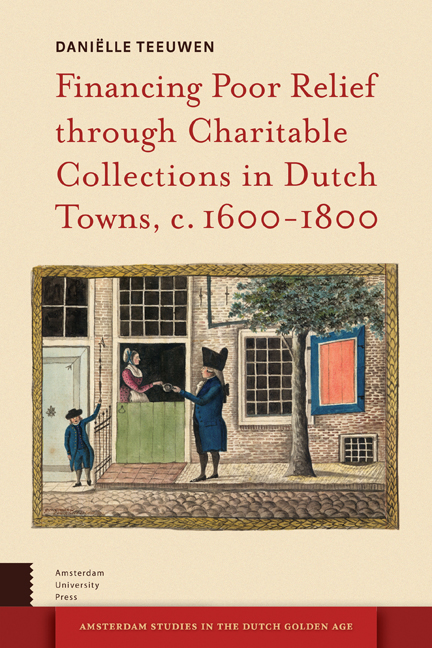Summary
The early modern Dutch welfare system has often been described as relatively generous and efficient. Not only foreigners visiting the Dutch Republic, but also present-day historians have asserted that the Dutch, together with their English neighbours, stood out in early modern Europe in terms of solidarity with the poor and needy in society. Different from the English case, in the Northern Netherlands an extensive national legal and regulatory framework on social care was absent, as were obligatory poor rates for the financing of charitable activities. In Dutch towns social care was organized at a local level and largely financed from donations made to collections in the churches and in the streets. As contributions to these charitable appeals were in principle voluntary and not enforced by law, the question arises how the early modern Dutch managed to finance a substantial part of their welfare system through charitable collections.
To understand how charitable donations could form the financial backbone of sustainable and relatively generous relief provisions, both the policies of town councils and church boards in organizing collections as well as the population's giving behaviour were studied. Based on archival research in the towns of Delft, Utrecht, Zwolle and ‘s-Hertogenbosch, in this book it is argued that despite the absence of a legal and compulsory framework for giving, secular and religious authorities still had effective means at their disposal to persuade and exhort the population to donate.
Financing poor relief in the Dutch Republic
Charitable donations were of major importance for the financing of outdoor relief provisions. In the seventeenth century, in three out of the four towns studied here, namely Delft, Zwolle and Utrecht, collection revenues formed the single largest source of income for civic institutions. Both the Delft Chamber of Charity and the Utrecht Almoners’ Chamber funded more than 40 per cent of poor relief from donations made in the churches and in the streets; for the Zwolle City Poor Chamber this was almost 70 per cent. Dutch Reformed charities as well as deacons from tolerated churches also usually financed the lion's share of their activities from charitable gifts collected during services. As established by a literature study on financial arrangements in other Dutch localities, ‘s-Hertogenbosch was an exceptional case.
- Type
- Chapter
- Information
- Publisher: Amsterdam University PressPrint publication year: 2015



